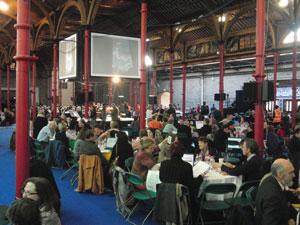Building an economy for society - Claiming Our Future's national event

Claiming Our Future is holding its third national event in Cork City Hall on Saturday, 5 November. The issue under discussion is developing an economy for society (agenda below). Politico put some questions to Niall Crowley, one of the organisers of Claiming Our Future. [You can register for your free place at the event here.]
In terms of the question being put forward on 5 November, 'What is your vision of social progress?', can people email submissions to you if they can't make it along to the event?
At this stage the purpose of the questions is to stimulate a debate at the event. We hope that a wider group will form from the event to take up the issues raised and to support further debate and action on the issues identified.
Were the issues for discussion on 5 November decided upon based on input from previous Claiming Our Future events? If not, how were they decided upon?
The theme for the event was decided on the basis of the priority themes identified at Claiming Our Future's first event at the RDS on 31 October, 2010 at which over 1,100 people deliberated (pictured above). The specific questions for debate were developed by a working group set up on this theme. The working group was established initially around people who came forward with an interest in developing this theme and has developed as a cross sectoral group bringing in people from across the different sectors involved in Claiming our Future.
Can you describe the format of the debates? Are they round tables with comments from the audience invited at the end? If so, who'll be at the tables (as it were)?
The debate is round table-based. There are no speakers. People will be at tables of 10 with a facilitator. They will discuss the questions posed and see what agreement exists among them. The facilitator will assist in drawing out areas of agreement. All the audience therefore participates at their tables.
Given the tenets of 'we are where we are' and 'there is no alternative' that have been peddled by the current government since it took office, do you have a vision as to how the value base on which COF is founded might begin to influence political decision making? Or do you see the movement as more of a long-term one, dedicated to nurturing this value base through the crisis?
Claiming our Future is trying to combine short term campaigning on issues of immediate concern with a more medium-term perspective. This medium-term perspective is not about preserving the value base for better times. It is aimed to be about promoting the value base, building broader support for the value base and demonstrating support for this value base. The idea is to build a civil society pressure behind the value base that cannot be ignored by politicians. The value base is that identified at the RDS event last year - equality, environmental sustainability, accountability, participation and solidarity.
Has COF tried to reach out to movements in other countries?
Claiming our Future has tried to contact and learn from movements in other countries. Such an evaluation of how our societies do/don't work is needed, Europe-wide and worldwide. We need to develop links that can enable learning about this and about movement building.
Has the base of COF broadened since the first event in 2010?
The deliberative model developed by Claiming our Future is designed for participation and to be open and inclusive. Claiming our Future is gradually evolving and growing an engagement from different people in different sectors. This is a slow process not made any easier by very limited resources.
As a preamble to the 5 November event, Claiming Our Future writes:
Our economic model of development is failing us. When judged by purely economic measures such as GDP growth is stagnant. The economic system doesn't serve society-unemployment is high, public services are being cut and wealth and income are increasingly concentrated in the hands of a few, creating damaging inequalities.It is bad for the environment- natural resources are rapidly diminishing and ecosystems on which we all depend are being destroyed.
It's time to talk about alternatives. It's time to talk about an economy for society.
Claiming Our Future in association with PlanBetter is organising a national discussion on our economic system in Cork. Individuals and people from a wide range of civil society organisations will talk through the issues on November 5th. A working group will be organised to implement the ideas discussed and to promote an economy for society.
- What is your vision for social progress?
- Does our economic system contribute to this vision?
- How does economic growth serve society, the environment and the economy itself?
- Do we need:
- Stronger regulation of corporation?
- Technological innovation?
- A new localism?
- Establishment of a new value base?
- A steady state economy?
- Basic Income?
- What do we need to do to advance alternatives?
- What do I need to do?
This event aims to:
- Share information and perspectives about whether our current economic system serves our society and the environment and what an economic system based on the values of environmental sustainability and equality would require.
- Encourage and support debate and action across the country to build support for an economic system based on environmental sustainabilityand equality.
- Identify initiatives that participants, civil society organisations and Claiming Our Future could take to progress alternatives to the current economic system.
Below is a voxpop from the first Claiming Our Future event in the RDS in October 2010.
The agenda for the 5 November event is below and may be downloaded here:
